Why Trump (or Harris) might fail to stand up to China
A very real possibility that more people need to be worried about.
For some Americans, the relevant question isn’t “Which candidate will stand up to China?”, it’s “Should the U.S. stand up to China at all?” There are still some progressives who believe that the negative turn in relations between the two countries is America’s doing, and that if we chose, we could simply stop “saber-rattling” and “warmongering” and return everything to the world of 2012. And there are some on the right who think the U.S. should abandon Asia to Chinese hegemony, retreat behind our oceans, and focus on culture wars at home — basically the same approach they take toward Russia and Ukraine.
Both of these groups are wrong. It is important for us to stand up to China, not just because of what they’re trying to do to the U.S. right now — force us to deindustrialize, sow division in our body politic, control our speech from afar, and so on — but what else they’ll do to us if we sit back and let them win Cold War 2. Knowing that the U.S. is a dangerous potential rival, China’s current leadership would do everything possible to weaken that rival. “Engagement” didn’t make the CCP pro-America before 2016, and it would be even less successful now. Someday the U.S. and China will be friends again, but for right now, what’s needed is a balance of power.
Most Americans, fortunately, probably realize this at an intuitive level. Opinions of China are strongly negative across all demographic groups — conservatives and liberals, old and young.
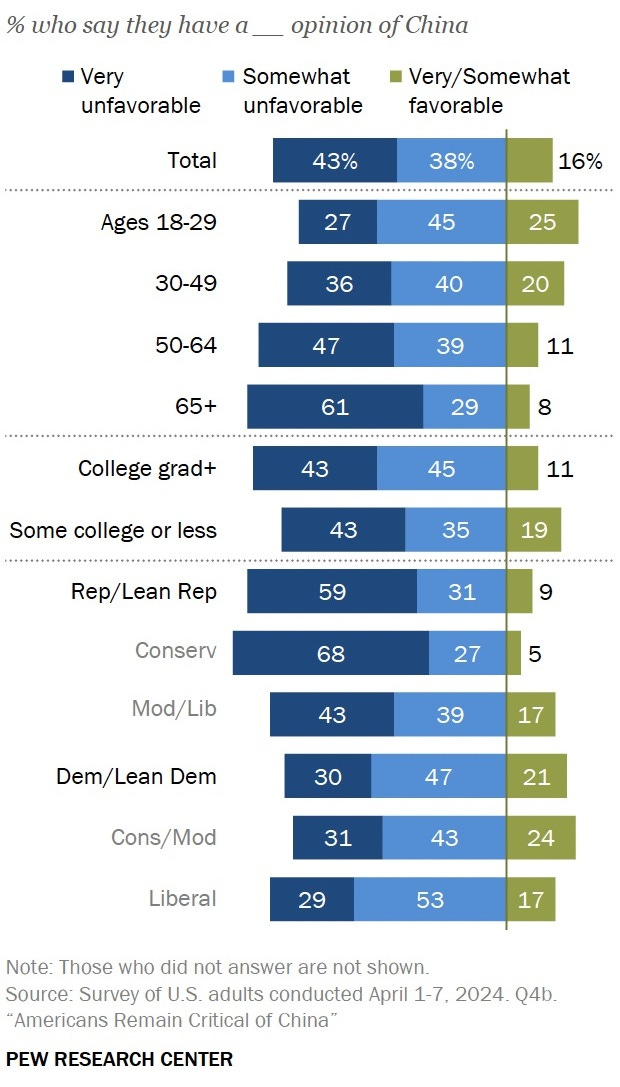
An overwhelming majority of Americans say that limiting China’s power and influence should be a priority for the U.S. government:

Joe Biden and his administration have been very tough on China — tougher even than Donald Trump was in his first term. Under Biden, the U.S. didn’t yet manage to resuscitate its defense-industrial base, but it strengthened its cooperation with Asian allies, increased military aid and arms sales to Taiwan, built new bases in the Philippines, encouraged American companies to relocate out of China, unleashed highly effective export controls on China’s chip industry, began to build up its domestic manufacturing industries, and acted swiftly to block a tide of Chinese exports from swamping U.S. industry.
When I ask whether the next President will “stand up to China”, I’m basically asking whether they’ll improve upon — or at least continue — these policies.
Unfortunately, there’s absolutely no guarantee this will happen. When it comes to China policy, there are reasons to worry about both candidates, but in my estimation, Trump is the much bigger worry.
The basic failure modes for Trump and Harris
For Trump, the big danger is that he won’t have anything to prove.
Remember the phrase “Only Nixon could go to China”? When Richard Nixon opened relations with Mao’s China in the early 1970s, he was able to do so because his unimpeachable credentials as an anti-communist gave him the political credibility to make overtures to a communist regime without being seen as an anti-American sellout. The perception of Nixon as a hawk allowed him to be a dove in substance.
Similarly, the public perception is that Trump is the ultimate China hawk. In fact, he did plenty to earn this perception in his first term. He tossed out the old policy of “engagement” and started a trade war. He implemented some export controls, made an attempt to root out Chinese espionage, tried to ban TikTok, and blamed China for Covid. This earned Trump a huge amount of cred as a guy who would stand up to China.
But precisely because he has this cred, Trump might be able to pull a 180 in his second term with few political consequences. If he drops export controls, withdraws support for Taiwan, snubs Asian allies, nullifies the TikTok divestment effort, and fails to reinforce America’s military posture in Asia, it’s possible that the American people will still think he’s a China hawk, because…well, just because he’s Trump. In ten years, we might find ourselves coining the expression “Only Trump could sell out to China.”
With Harris, the danger is that she’ll view her administration not as continuous with Biden’s, but as picking up where Barack Obama left off. Obama was a good President in general, but on China he fumbled the ball. His “pivot to Asia” was largely rhetorical, and he clung to the hope that “engagement” — i.e., letting China do all the world’s manufacturing — would cause the country to liberalize. That attitude was already dangerously complacent in the early 2010s, and to bring it back now would be madness. But it’s possible that Harris might not realize this.
So that’s the basic shape of my concern. Let’s get a little more specific about what could go wrong.
Trump could sell America out for cash
In the book Wireless Wars, Jonathan Pelson tells the story of a British man named John Suffolk. Suffolk had been the United Kingdom’s Chief Information Officer, during which time he had warned the country about the security risks posed by Huawei. He was then hired by Huawei as a “global cybersecurity officer”, after which he pulled a complete 180 and became the company’s staunchest advocate. It’s a chilling lesson in how deep China’s pockets are, and how easy it has been able to buy many of its critics.
Although his followers don’t like to admit it, Donald Trump has a tendency to support anyone who gives him a big bag of cash. This was painfully evident back in March, when Trump executed an abrupt flip-flop of his position on TikTok divestment. The reversal came immediately after a billionaire named Jeff Yass, who owns a large share in TikTok, met with Trump and promised him large campaign contributions. Here’s what I wrote at the time:
And then, suddenly, the Chinese company found a savior. That savior’s name was Donald Trump. In a stunning reversal, Trump came out swinging against a TikTok ban:
Donald Trump appeared to come out in defense of TikTok, the social media platform facing a potential ban by Congress, in a post late Thursday on his social media platform Truth Social — the same platform that experienced a widespread outage as the former president attempted to live-tweet President Joe Biden’s State of the Union speech.
“If you get rid of TikTok, Facebook and Zuckerschmuck will double their business. I don’t want Facebook, who cheated in the last Election, doing better. They are a true Enemy of the People!” Trump wrote on Thursday night.
Pretty soon, MAGA faithful like Vivek Ramaswamy were lining up to agree with Trump.
Observers quickly came up with a theory for why Trump flip-flopped. Trump recently had a very cordial meeting with the billionaire Jeff Yass, who has a $33 billion stake (yes, you read that right) in the Chinese-owned company:
One American who does not [want to force TikTok to sell] is Jeff Yass, a conservative hedge-fund manager who has a $33 billion stake in TikTok and has reportedly threatened to cut off funding to Republicans who support the divestment bill.
Last week, Yass visited Mar-a-Lago, where Trump praised him as “fantastic,” and media reports touted that Yass could potentially contribute generously to Trump’s campaign.
Trump badly needs money; his campaign is hurting for funds and he’s in legal trouble as well. Given that, plus his record of corruption, it’s absolutely plausible that he’d sell out to an ally of the Chinese Communist Party for a few bucks. The theory is bolstered by the fact that former Trump advisor Kellyanne Conway is being paid by the Club for Growth to advance ByteDance’s interests on Capitol Hill; Jeff Yass is the Club’s biggest donor.
So there’s the obvious danger that this could just happen again and again. China’s government has deeper pockets than any billionaire or any corporation, or…well, anyone. If Trump sells America out to the highest bidder, that highest bidder is going to be China.
Trump could focus on empty “wins”
During his first term, Trump put tariffs on Chinese goods and put export controls on Chinese companies Huawei and ZTE. But he then partially backtracked on both of those efforts after empty promises and relatively minor pressure from China.
In 2020, Trump agreed to stop raising tariffs on China in exchange for China purchasing U.S. agricultural goods — the so-called “phase one agreement”. Trump kept his part of the bargain, and claimed it as a huge victory for Making America Great Again. But China simply lied and bought almost nothing from the U.S.:
President Donald Trump signed what he called a "historical trade deal" with China that committed China to purchase $200 billion of additional US exports before December 31, 2021. Today the only undisputed "historical" aspect of that agreement is its failure…
The phase one agreement committed China to increase its purchases of certain US goods and services in 2020 and 2021 by at least $200 billion over 2017 levels…China agreed to buy at least $227.9 billion of US exports in 2020 and $274.5 billion in 2021, for a total of $502.4 billion over the two years.
Ultimately…China ended up buying none of that extra $200 billion of US exports it had promised to purchase.
Art of the deal, indeed.
Trump also relented on export controls on ZTE. Congress tried to intervene to save the export controls, but failed. Here’s what former GOP Congressman Adam Kinzinger had to say about that:
So much of Trump’s first-term record isn’t actually that tough on China — it’s one of initially tough policies followed by capitulation. Between that and the TikTok flip-flop, it’s not clear why we should expect a second term to be different.
Trump could give Taiwan the Ukraine treatment
The biggest flashpoint for U.S.-China relations is Taiwan. A Chinese invasion of the island would severely compromise the security of U.S. allies (most importantly Japan), cut off much of U.S. chip supply, and probably signal the beginning of a more general Chinese domination of Asia. Biden inched the U.S. away from its traditional posture of “strategic ambiguity” with repeated promises to aid Taiwan in the event of a Chinese attack. Whether that was the right move, or whether strategic ambiguity should be preserved in its traditional form, is a hotly debated matter in the national security community.
But one thing I haven’t seen any foreign policy experts suggest is that the U.S. should publicly suggest abandoning Taiwan. Yet this is exactly what Trump seems to have done in a series of recent statements. Most recently, he did an interview with Bloomberg Businessweek in which he bashed Taiwan for its success in chip manufacturing, and appeared to argue that the island is indefensible:
Asked about America’s commitment to defending Taiwan from China, which views the Asian democracy as a breakaway province, Trump makes it clear that, despite recent bipartisan support for Taiwan, he’s at best lukewarm about standing up to Chinese aggression. Part of his skepticism is grounded in economic resentment. “Taiwan took our chip business from us,” he says. “I mean, how stupid are we? They took all of our chip business. They’re immensely wealthy.” What he wants is for Taiwan to pay the US for protection. “I don’t think we’re any different from an insurance policy. Why? Why are we doing this?” he asks.
Another factor driving his skepticism is what he regards as the practical difficulty of defending a small island on the other side of the globe. “Taiwan is 9,500 miles away,” he says. “It’s 68 miles away from China.” Abandoning the commitment to Taiwan would represent a dramatic shift in US foreign policy—as significant as halting support for Ukraine. But Trump sounds ready to radically alter the terms of these relationships.
He also bashed Nancy Pelosi for visiting Taiwan.
Trump’s words on Taiwan have alarmed some of his fellow Republicans, and rightly so. But if Trump does abandon Taiwan, the party leadership will likely go right along with him. Already, the GOP platform has scrubbed any mention of Taiwan, for the first time in over 40 years:
For the first time since 1980, Taiwan didn’t rate a mention in the Republican National Committee’s party platform released this week. Compare that with the platform in 2016 (the GOP didn’t produce one in 2020) that described the island as a “loyal friend” and pledged to “help Taiwan defend itself.” The RNC’s exclusion of Taiwan in the platform came despite intensive outreach by Taiwan’s diplomatic outpost in Washington, the Taipei Economic and Cultural Representative Office, to persuade GOP allies to get Taiwan into the platform, two people familiar with that effort told China Watcher…The RNC didn’t respond to requests for comment.
It doesn’t exactly take a foreign policy genius here to see that Trump and at least some of his people are strongly considering giving Taiwan the Ukraine treatment. That signals weakness to China’s leadership and could even invite a war that otherwise would have been deterred.
As a possible bright spot, Trump’s vice presidential nominee JD Vance has expressed strong support for defending Taiwan, and Trump’s former national security adviser Robert C. O’Brien is a staunch advocate of “peace through strength”. But it’s not clear how much influence these folks would have over Trump on the Taiwan question.
The MAGA movement could decide that Xi Jinping is our friend
Personally, I don’t put much stock in Trump’s tendency to say nice things about Xi Jinping. He did that all throughout his first term, even while moving U.S. policy in a more anti-China direction, so I think this rhetoric is a red herring.
Much more worrying is the evidence that Trump’s political base — or at least the online part of it — is shifting toward a pro-China stance. Twitter user and former Noahpinion guest blogger Pourteaux has a long-running thread keeping track of anti-anti-China statements from MAGA figures and online rightists like Tucker Carlson. A couple examples:
Part of this is just isolationism. But part of it comes from the idea that MAGA’s true enemy is American liberals, and that in order to fight this enemy, foreign dictators like Putin and Xi Jinping should be viewed as allies — a sort of global alliance of autocracy. Tucker certainly seems to subscribe to this idea, but Trump himself and some of his allies — even ones like Mike Pompeo who were tough on China during Trump’s first term — have said similar things:
If Trump decides that appeasement of China, even at the cost of Taiwan and Chinese economic supremacy, is necessary in order to focus on fighting Trump’s internal enemies, we’re all in a whole lot of trouble. A whole lot of commentators are now starting to get worried, but with Trump a clear favorite in the prediction markets and election forecasts, it might be too little too late.
Harris could fall back on the failed policy of “engagement”
I’m much less worried about Kamala Harris than I am about Donald Trump when it comes to China policy. Unlike Trump, Harris generally seems like someone who tends to continue her predecessors’ policies. Jordan Schneider of ChinaTalk has a good thread in which he argues that Kamala’s China policy would be similar to Biden’s. Some excerpts:
And for what it’s worth, Chinese nationalists seem to prefer Trump over Harris.
But although this is good, it doesn’t fully reassure me yet. For one thing, although Biden enacted tariffs on China that were even higher than Trump’s, Harris consistently slammed tariffs and protectionism back when she was running for President in 2019 and 2020. She seems amenable to the idea of restricting free trade in the name of labor rights and environmental concerns, but unlike doesn’t seem to see tariffs as a tool of national security — a way of preserving defense-related manufacturing capacity against the possibility of a conflict with China.
Also, Harris’ national security adviser, Philip H. Gordon, argued during Trump’s first term that engagement with China was a wise policy and that many elements of it should be brought back:
It is true that abandoning Cold War confrontation in favor of a more constructive relationship in the early 1970s did not lead to domestic political reform [in China] as some optimists had hoped. But…It was a nuanced, bipartisan China strategy that paid off in many ways…The establishment of diplomatic relations hardly made it an ally of the United States or erased the profound differences between the two counties, but the benefits of not having China as an enemy have now endured for so long that they are largely taken for granted. If [Mike] Pompeo’s rhetorical assault stokes the fire of Chinese nationalism and leads to unrestrained military and political competition, as looks increasingly likely, the benefits of engagement will once again become apparent.
Even in economic terms, Pompeo’s suggestion that the American people have nothing to show for 50 years of engagement with China is…at odds with the facts…[T]he notion that trade with China has been a one-way street overlooks the benefits that two generations of Americans have reaped from importing affordable consumer goods, low-cost inputs for high-end manufacturing exports, and growing U.S. export surpluses in services and agricultural products…[T]he idea that U.S. consumers or exporters would benefit from cutting off trade with China even further is deeply misguided. The response to problematic Chinese trade practices is to join forces with U.S. allies in Asia and Europe to address them, not to pursue a failed tariff war or the fantasy of “decoupling” the two economies in ways that would hurt American workers, farmers, and consumers.
I don’t know if Gordon still thinks this, or if what he thinks is representative of what Harris would think as President. But it’s very worrying rhetoric, considering that it goes directly against the Biden administration’s whole approach to China.
Nowhere does Gordon acknowledge the military importance of preserving U.S. manufacturing capacity — something that Biden’s own national security adviser, Jake Sullivan, understands very well. Nor does Gordon acknowledge that China itself has been striving to decouple from the U.S. all on its own, and has been making great strides in this regard, threatening to turn a two-way economic dependency into a one-way dependency. Nor does Gordon seem to realize that despite America’s best efforts to court China as a partner, overthrowing U.S. hegemony and degrading U.S. power is at the centerpiece of Xi Jinping’s foreign policy approach.
In other words, there is at least the possibility that Kamala Harris might think we’re still living in the pre-Xi world of 2012, and might view Biden’s attempts to stand up to China as an unnecessary continuation of Trumpist aggression rather than as a crucial but inadequate step toward shoring up global security. I don’t know how strong this possibility is, but until we hear more from Harris on the topic, I will continue to worry.
That all having been said, my worries about Trump on this front are still much greater.
U.S. national interests are best served by a peaceful world where authoritarian powers don’t try to conquer their smaller, weaker neighbors, and where global trade is conducted for mutual benefit instead of as a form of mercantilist beggar-thy-neighbor competition. That goal requires that the U.S. recognize China’s movement away from peaceful economic development and toward assertive nationalism and totalitarianism under Xi Jinping. And it requires strong steps on the economic, diplomatic, and military fronts to dissuade China from launching a reckless war that plunges Asia into violence and chaos. I hope that whoever gets elected President this year is up to that task. Right now I’d definitely pick Harris over Trump for this reason alone, but that doesn’t mean she has my full confidence either.


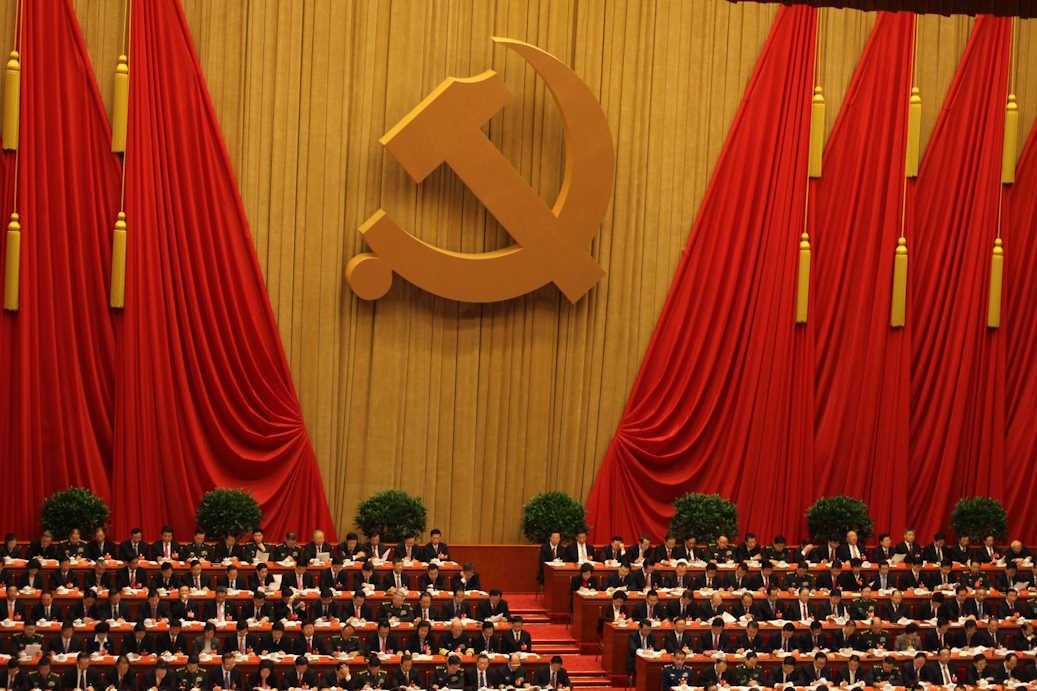
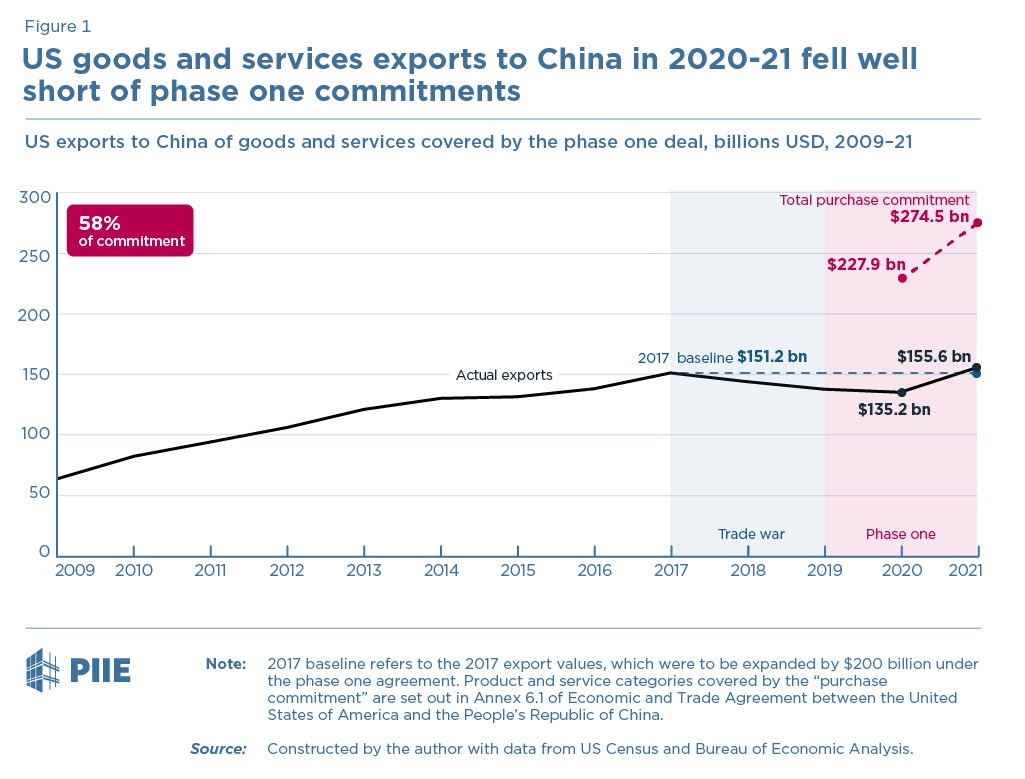


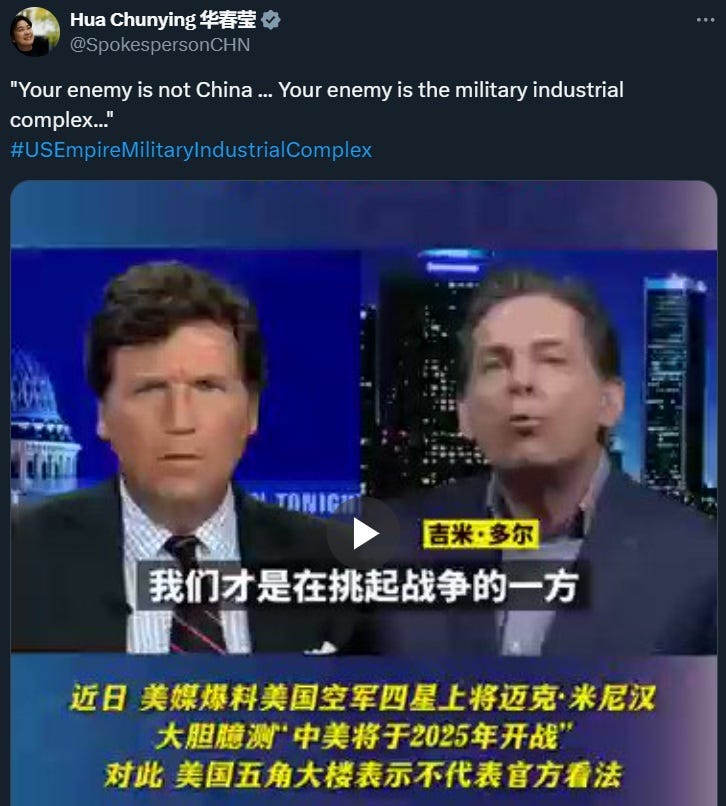




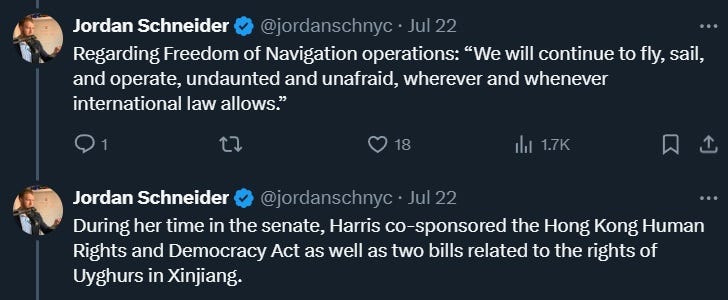
Noah Smith today: Donald Trump has a tendency to support anyone who gives him a big bag of cash
Kathleen Weber Jul 17 liked by Noah Smith
I believe one reason why big business would be fine with Trump is because they know for a lousy $100 mil, they can get any executive order they want. That's a bargain!
Do I hear an echo in the room?
To boil it down, DonOLD Trump is just too dumb and greedy to go toe to toe with China. “Do Xi a favor,”— I can see DJT playing a super old Michael Corleone in the next Godfather sequel.